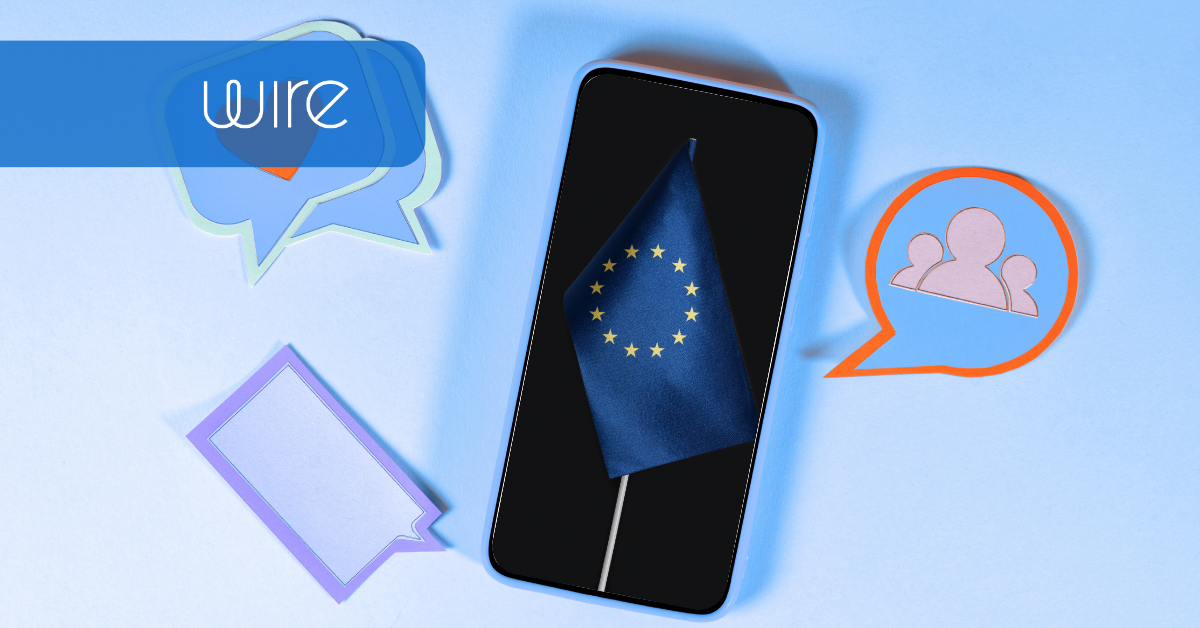Why Secure Messaging Matters More Than Ever in Europe
The way Europe works and communicates is changing. Hybrid and fully remote work models are now a reality for many EU enterprises and this shift has resulted in a significantly expanded attack surface for threat actors. At the same time, regulations like the NIS2, DORA, and the EU Data Act mandate clear audit trails, sovereign data processing, and rapid breach reporting. Together, these forces make secure, privacy-first, communication tools not just important, but essential for enterprises and organizations.
Enterprises are realizing that emails and consumer-grade messaging tools can no longer keep their communication safe or their data private. And increasing concerns around US extraterritorial laws like the CLOUD Act is driving the demand for secure and European-built messaging platforms that meet operational and sovereignty needs.
What Defines a “European” Messaging App
To be considered genuinely European, a messaging app must be compliant with EU regulations, and also meet growing demand for autonomy, transparency, and sovereignty. Here are the key attributes that make a communication platform offer:
EU jurisdiction and legal control
Europe has relied on US-based hyperscalers and solution providers for decades. Microsoft Teams now adheres to EC rulings on privacy and unbundling from the MS Office 360 suite. But it is still subject to US extraterritorial laws like the CLOUD Act that are in direct conflict with EU regulations. A European messaging platform must ensure that all data and meta data comply with regional legal frameworks.
Data residency within the EU
The GDPR imposes restrictions on data transfers outside the EEA and the EU is pushing for stricter data residency rules especially for sensitive sectors like defence, healthcare, critical national infrastructure, and financial services. A European messaging app must ensure that all data including message content, metadata, and backups are stored and processed in servers physically located within EU or EEA geographical limits.
Privacy First
The EU has long championed data privacy and the GDPR remains one of the world’s most comprehensive privacy regulations. A privacy-first communication tool must ensure robust end-to-end encryption, secure-by-design architecture, data minimization, and transparent data handling.
Key Security Features to Look For
Here are the key security features to consider when evaluating a messaging and communication platform:
- End-to-end encryption (E2EE): Even the most widely used platforms like MS Teams or Slack do not offer end-to-end encryption of all files and messages shared on their platform. End-to-end encryption ensures that only the intended recipient can access information. Messages and files must be encrypted at rest and in transit to guarantee maximum security.
- Open-source transparency: Avoiding vendor lock-in and ensuring transparency are foundational elements of Europe’s digital sovereignty agenda. As a result, communication apps must operate on open-source architecture with publicly available codebases and source code. This will help foster trust, demonstrate there are no hidden data flows or backdoors, and allow independent audits.
- Zero-trust architecture: Even secure platforms like MS Teams and Slack have backdoor access points that threat actors can exploit. In addition to end-to-end encryption, the tool must also operate on a zero-trust architecture where it does not trust any user, application, device, or network by default. It must have robust verification and continuous monitoring processes in place.
- Messaging Layer Security (MLS): MLS is an emerging Internet Engineering Task Force (IETF) standard that provides cryptographic security for large group communications. A communication tool built using MLS protocols can secure all group communications ensuring confidentiality and integrity of all data and discussions held on it.
Overview: European Messaging Apps and Their Use Cases
Across Europe, new alternatives to Microsoft Teams, Slack, and WhatsApp are gaining traction as organizations increasingly seek communication solutions that comply with European data protection laws and jurisdictional standards.
Wire (Switzerland/Germany)
Wire offers an open-source, federated platform that uses MLS to fully encrypt all files, discussions, calls, and documents shared. It complies with all relevant EU regulations and holds ISO 27001 and ISO 27701 certifications. Its servers are located in Germany and Ireland, ensuring complete data residency. It also offers on-premises deployment options making it an ideal choice for governments, and organizations in sensitive industries like defence and healthcare.
Threema (Switzerland)
Threema is a Swiss-based messaging platform that benefits from the country’s strong privacy laws. It operates on zero-metadata principles and ensures always-on end-to-end encryption. Users can register without providing a phone number, and its enterprise version, Threema Work, supports anonymous user management and self-hosting. However, Threema does not yet offer multi-device synchronization or federation, and its desktop app requires a mobile connection. Despite these limitations, it remains a trusted choice for individuals, NGOs, and government entities prioritizing privacy and data protection.
Element/Matrix (UK/EU)
Built on the Matrix open protocol, Element offers decentralized messaging that enables cross-organization collaboration. While it supports end-to-end encryption, its federated architecture can expose metadata and cross-border data flows, making full GDPR and NIS2 compliance difficult to guarantee. Public sector pilots in France and Germany have explored it for digital sovereignty projects, though concerns remain about data residency and privacy consistency across federated servers.
Proton (Switzerland)
Known for its encrypted email services, Proton also offers Proton Drive and Proton VPN, that enable privacy-first collaboration under strict Swiss data protection laws. It’s ideal for privacy-conscious enterprises and NGOs.
Download The Enterprise Guide to European Alternatives
Conclusion: The Future of Secure Messaging in a Sovereign Europe
Europe is moving ahead with its drive for digital sovereignty. Secure and EU-compliant communication is a foundational element of this agenda. But safeguarding data and adhering to laws is only one piece of the puzzle. European messaging apps must also be interoperable, federated, and ensure open-source transparency. A platform like Wire delivers the end-to-end encrypted, zero-trust architecture communications that European organizations need to protect data and meet regulatory requirements. As the risk landscape continues to evolve, platforms like Wire and others will prove to be a key driver of European resilience, driving public trust and legal alignment.
